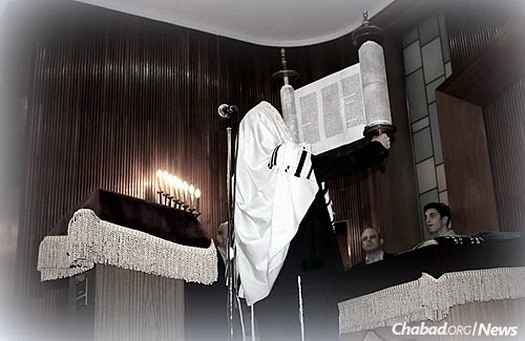
North Shore of Massachusetts Rides a New Wave of Jewish Life
From its idyllic seaside communities to a score of inland villages, towns and small cities founded during the Colonial era, Massachusetts’ North Shore is a region that’s both proud of its history and poised for future growth.
“Connecting generations” was a fitting theme, organizers say, for Chabad of the North Shore’s celebration of its 23rd anniversary and Torah rededication last Sunday—an event that drew more than 200 people, including Massachusetts Gov. Charlie Baker and first lady Lauren Baker. The couple was given the Lamplighter Award and a menorah as part of the evening, and guests say they were visibly touched by the presentation on behalf of the Jewish community.
The Bakers spoke on June 7 about their admiration for the wisdom and depth of Jewish traditions. In fact, they told an anecdote about the time they attended a bat mitzvah and were so moved by the mother’s words to her daughter that they decided to give their own similar inspirational talks to their three children when they turned 13.
Indeed, Chabad of the North Shore, based in Swampscott, Mass., has been bridging people and generations from the get-go. It got its start in 1992 and has grown by leaps and bounds, as has the Jewish population it serves, according to co-directors Rabbi Yossi and Layah Lipsker, who have six children ranging in age from 13 to 23.
There’s the new Aleph Academy preschool. There’s an active daily minyan. They are close to breaking ground on a mikvah.
The area incorporates a “very diverse mix of every group and every demographic” of Jewry, says the rabbi. It’s a large area, too; the North Shore encompasses 23 cities and towns north of Boston, with an estimated 40,000 Jews.
The majority of the Jewish population north of Boston has traditionally lived in the semi-urban city of Brookline and the more suburban city of Newton, to the west of Boston proper. There is also a sizable Jewish population in Cambridge, home of Harvard University and the Massachusetts Institute of Technology, and pockets of Jewish families to the south, in places like Sharon, Mass.
But the North Shore—the region between Boston and New Hampshire—is picking up steam, especially for young couples who are starting to consider picturesque seaside communities and smaller towns and cities as viable and attractive alternatives to the more established Jewish areas.
As a result of innovative Shabbat programming, it’s not unusual to see more than 100 people attending synagogue at Chabad.
Especially popular have been “hot Shabbat” (a Shabbat-morning program geared for the entire family by providing different options, including a Torah class during some of the services for people not able to read along, followed by a sit-down communal lunch) and the groundbreaking “Friday Project” (an initiative that teaches the melodies and meaning of Kabbalat Shabbat through hands-on workshops, followed by scheduled Friday nights where participants feel empowered to join in).
New Couples, New Energy
Twelve years ago, the Lipskers hired Rabbi Nechemia and Raizal Schusterman to formally establish a new branch in Peabody—Chabad of Peabody Jewish Center—and this past weekend celebrated the grand opening and dedication of a stunning new permanent facility there as well.
More recently, in 2011, Rabbi Shmaya and Aliza Friedman moved out to assist the Lipskers in their work.
“People have really embraced us and our goal,” says Rabbi Lipsker, which is “to continue to strengthen and revitalize Yiddishkeit throughout the entire North Shore.” As for the Friedmans, he says “it feels like they have been with us from the beginning.”
The Friedmans are charged with youth activities, the summer camp and the new Aleph Academy, a cutting-edge preschool that opened last fall with the assistance of a grant from the Machne Israel early-childhood initiative. It began with six children and soon doubled to 12; this year, it will incorporate two full classes serving 20 children.
There has been an “off-the-charts buzz without any marketing,” says Lipsker of the school. “It seems like everyone wants to get into the Aleph Academy.”
Rabbi Friedman agrees, noting that “the community really responded in an incredible way. We needed a different approach to early-childhood education for this growing demographic—giving their children a Jewish education right from the start.”
He says the preschool infuses Judaism into everything the kids do, even the secular education, which emphasizes positive messages of helping and doing, and correlates that to everyday activities. “Our standard,” according to the rabbi, “is to reach for nothing less than excellence in all aspects of the program, and this has clearly resonated well with this very thoughtful constituency.”
On the flip side of the equation, Chabad is boosting an older entity as well. It’s in the process of merging with a nearby Orthodox synagogue, Ahabat Sholom in Lynn, Mass., which was without a rabbi and looking to breathe new life into its programming. The two congregations have been gradually joining together for Shabbat and holiday services, events, and other social and spiritual ways.
“It seemed like the perfect shidduch [match] … their shul and ours,” says Friedman.
In fact, last Sunday’s celebration began at the older synagogue with a Torah precession leading to Chabad of the North Shore, where a rededication ceremony was held.
Lipsker explains that the Torah honors the memory of Alan Kaplan, who studied Torah with him on Thursday nights when Lipsker was a rabbinic intern in the Brookline-based New England Hebrew Academy. Kaplan passed away at a young age, and at the time, his family contributed a Torah Ahabat Sholom. It was now being transferred to Chabad.
“It’s very meaningful,” says Lipsker. “It was a celebration of goodness and life, and of the continuity of Yiddishkeit. It’s a statement of hope.”
A Full Range of Support
Like Chabad centers in the United States and around the world, people turn to the Lipskers and the Friedmans for a full range of Jewish support—from birth to death and everything in-between.
“We offer a wide array of Jewish programming to get people through the door,” says Lipsker.
Sure, he acknowledges, “we promote and run events that engage and appeal to the hip and the tech-savvy young Jew of today. Though they initially come for the appealing part, they remain for the authenticity and warmth they experience. They remain because ultimately what our generation is really looking for is a more spiritual place to grow, particularly when they have families.”
Purim is the grand event, one that attracts as many as 400 people.
But Lag BaOmer came in a close second this year in terms of numbers. Chabad held a block party with a kosher-food truck that came in from Boston, as well as entertainment. The event drew more than 300 people—far more than was expected. “People just came out of the woodwork,” says Friedman, “and they had a great time.”
And during Chanukah, the rabbis decided last year that instead of doing just one public menorah-lighting, they would have menorahs everywhere. So they put up 18 of them in different towns, holding lightings with respective dignitaries at each one, even designing a designated website for the project.
They’re planning to be even more ambitious this winter, notes Lipsker: “We are aiming for 24 menorahs this Chanukah as we embark on our 24th year on shlichus.”
‘A Heartwarming Experience’
Howard and Sharon Rich, longstanding philanthropists and pillars of the North Shore community, feel strongly about the importance of supporting Chabad and its many offerings. “Being Jewish is the most important part of everything I have become,” says Howard Rich, who has been connected with the Chabad House from the very beginning. “There’s something about the joy one finds there that allows one’s spirit to soar. When you’re in that frame of mind, you feel closer toG‑d.”
His wife adds that “as one gets older, one has different needs and finds them in unexpected places.”
She fondly recalls Rabbi Lipsker coming to her house with his young children before Purim years ago, bringing her food and other gifts. “We invited them in, astonished that somebody who followed the law so much more strictly than we could aspire to do was so nonjudgmental and easy to talk to. It was eye-opening—a heartwarming experience.”
Yet it’s not only congregants who become roused, who are filled with awe. The two rabbis are getting ready this week for Gimmel Tammuz, the 21st anniversary of the passing of the Lubavitcher Rabbi—Rabbi Menachem M. Schneerson, of righteous memory. Events throughout the world will honor his life, wisdom, inspiration and Torah teachings.
The Lipskers were the last Chabad-Lubavitch emissaries that the Rebbe sent out by handwritten letter, in 1992, prior to his stroke. That letter, says Rabbi Lipsker, “sits framed on my desk. It’s the first thing I see when I sit down for work.
“The Rebbe’s unprecedented and bold vision of a post-Holocaust Jewish renaissance was nothing short of exhilarating,” he continues, “and all I have ever wanted was to be part of the worldwide, joyous and upbeat spiritual infrastructure that the Rebbe imagined.”
Friedman, 28, like many young Chabad rabbis, never met the Rebbe in person. But he says he is motivated by him every day.
The Rebbe’s vision, he says, “was to bring the light of Yiddishkeit to every nook and cranny of the world.”
“That vision was so powerful that it continues to empower people my age to go out on shlichus”—on their mission, he explains. “The way he saw the world and wanted to change the world is something that is timeless and ageless. The message is so profound that it still has the ability to inspire those who never met him.”
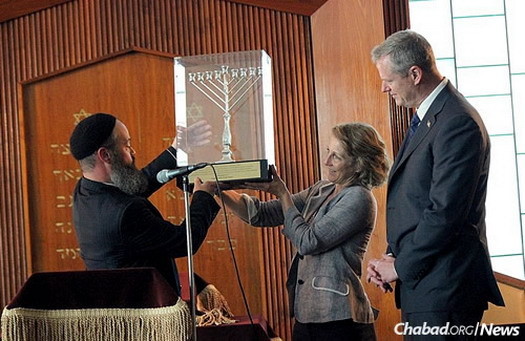
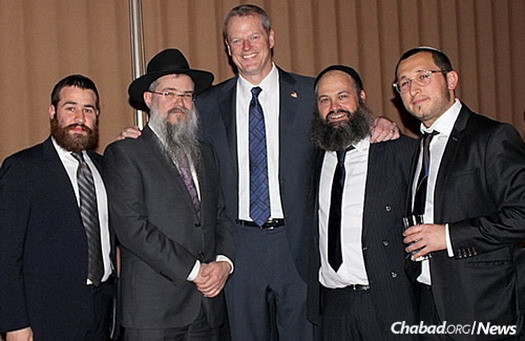
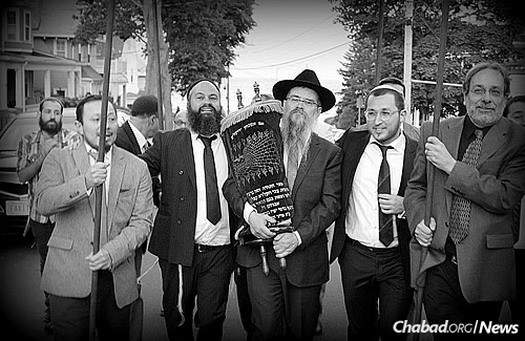
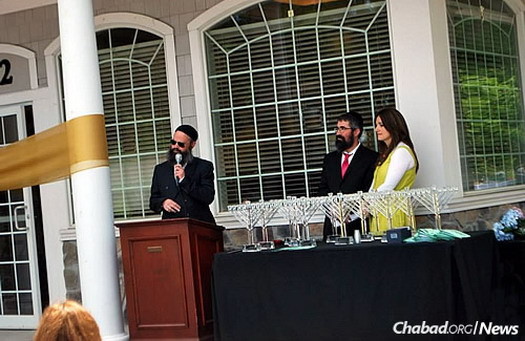
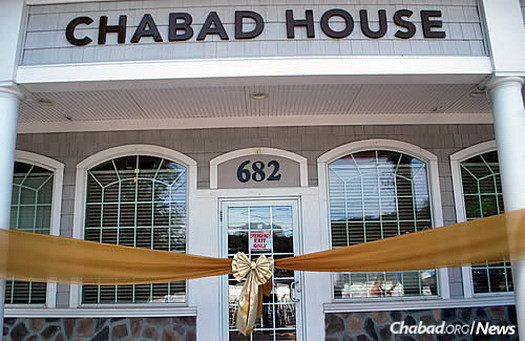













Bostonian
Wicked yasher koach!